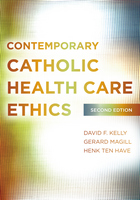
As David Kelly writes, "Catholic moral theology has not been completely constant over the centuries; it has learned and developed." In Contemporary Catholic Health Care Ethics he demonstrates how Catholic health care ethics can—and should—evolve similarly in response to the lightning speed of modern medical advances. Kelly draws on and analyzes the Catholic tradition of medical ethics—but he does not shy away from criticizing it as well, giving health care professionals, hospital ethics committees, and students a fresh treatment of Catholic health care ethics emphasizing theology, methodology, and application.
First discussing the Catholic understanding of the human person, Kelly proposes a Catholic Christian approach to the meaning of human life as it applies specifically to health care. He includes a brief history of the relationship between religion and medicine, and makes strong claims about how theology ought and ought not to be applied in health care ethics. Drawing from the terminology and approaches used by secular bioethics, he suggests how a Catholic perspective on health care can utilize certain secular moral-philosophical positions, even as they apply to the issues of birth control, and end-of life concerns. As practitioners, patients, and families face the difficult decision to continue or stop treatment for dying patients, Kelly compassionately, but practically, explores their concerns in light of American law and ethics. Finally, he provides measured insight on pain management, hospital ethics committees, stem cell research, genetic engineering, and allocation of health care resources.
Contemporary Catholic Health Care Ethics is informed, challenging, articulate, and bold—bringing to the extremely important field of Catholic health care ethics a much-needed and welcome voice, unafraid to speak to the most difficult issues of the 21st century.

Contemporary Catholic Health Care Ethics, Second Edition, integrates theology, methodology, and practical application into a detailed and practical examination of the bioethical issues that confront students, scholars, and practitioners. Noted bioethicists Gerard Magill, Henk ten Have, and David F. Kelly contribute diverse backgrounds and experience that inform the richness of new material covered in this second edition.
The book is organized into three sections: theology (basic issues underlying Catholic thought), methodology (how Catholic theology approaches moral issues, including birth control), and applications to current issues. New chapters discuss controversial end-of-life issues such as forgoing treatment, killing versus allowing patients to die, ways to handle decisions for incompetent patients, advance directives, and physician-assisted suicide. Unlike anthologies, the coherent text offers a consistent method in order to provide students, scholars, and practitioners with an understanding of ethical dilemmas as well as concrete examples to assist in the difficult decisions they must make on an everyday basis.

For over thirty years, David F. Kelly has worked with medical practitioners, students, families, and the sick and dying to confront the difficult and often painful issues that concern medical treatment at the end of life. In this short and practical book, Kelly shares his vast experience, providing a rich resource for thinking about life's most painful decisions.
Kelly outlines eight major issues regarding end-of-life care as seen through the lens of the Catholic medical ethics tradition. He looks at the distinction between ordinary and extraordinary means; the difference between killing and allowing to die; criteria of patient competence; what to do in the case of incompetent patients; the meaning and use of advance directives; the morality of hydration and nutrition; physician-assisted suicide and euthanasia; and medical futility. Kelly's analysis is sprinkled with significant legal decisions and, throughout, elaborations on how the Catholic medical ethics tradition—as well as teachings of bishops and popes—understands each issue. He provides a helpful glossary to supplement his introduction to the terminology used by philosophical health care ethics. Included in Kelly's discussion is his lucid description of why the Catholic tradition supports the discontinuation of medical care in the Terry Schiavo case. He also explores John Paul II's controversial papal allocution concerning hydration and nutrition for unconscious patients, arguing that the Catholic tradition does not require feeding the permanently unconscious.
Medical Care at the End of Life addresses the major issues that inform this last stage of caregiving. It offers a critical guide to understanding the medical ethics and relevant legal cases needed for clear thinking when individuals are faced with those crucial decisions.
READERS
Browse our collection.
PUBLISHERS
See BiblioVault's publisher services.
STUDENT SERVICES
Files for college accessibility offices.
UChicago Accessibility Resources
home | accessibility | search | about | contact us
BiblioVault ® 2001 - 2024
The University of Chicago Press









